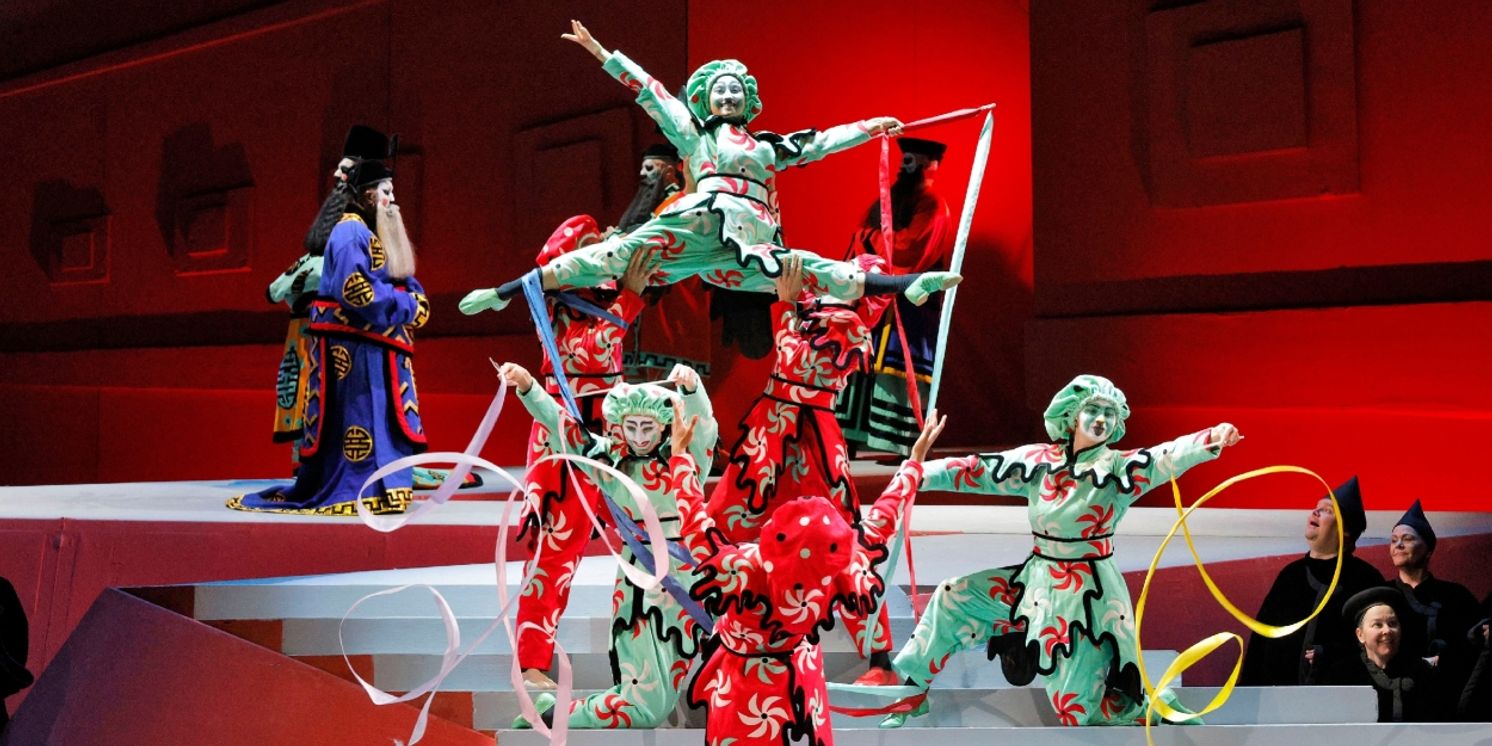
Garnett Bruce’s staging of Turandot, now playing for the first time at the Dorothy Chandler Pavilion seems to respond to the prompt, “explain the story to me like I’m a fifth grader.” Against David Hockney’s brightly colored, impressionist riff on Chinese pagodas, key story elements captivate the eye in ways that supersede the need for supertitles. A sharp blade wielded threateningly, forced perspective creating looming palatial walls, the rotting heads of failed suitors, and a princess literally shrouded in mystery quickly orient us within Puccini’s iconic fairytale. This is not to say the production is reductive or even simple— in fact, under Thomas J. Munn’s lighting design, recreated for this production by Gary Marder, even the clean, abstract shapes of Hockney’s world are made complicated by shadows which deepen the visual appeal and add to the intrigue of the tale. The clarity conjured by the blockish scenery and Ian Falconer’s color-drenched costumes allows the score and the humanity of the story to flourish.
Conductor James Conlon’s passion for the score is evident, but he stops short of becoming precious, allowing a gusto to carry the piece which may surprise contemporary audiences. There is nothing stuffy or tedious about this production, and the score feels tailored to a modern attention span; crescendos of profound impact precede each intermission, drawing us back with fervor for more. Taking on the titular role, Angela Meade is the star of the evening, her piercing voice capturing the iciness of the murderous princess and later earning our sympathies as she explains her motives. Russell Thomas’ Caláf is a fitting counterpart, alchemizing the murmurs of excitement which greet the opening chords of “Nessun dorma” into roaring applause. The final act between the two rivals in the palace’s garden is one of the most visually and aurally stunning performances likely to appear on an LA stage this season.
The production is of course shrouded in an air of uncertainty. An essay in the program presupposes the audience’s discomfort at seeing Chinese culture in such a historically-inaccurate way, and we are assured the Asian Opera Alliance has guided the remounting of this production. At select performances, Dr. Tiffany Kuo will provide post-show context for the history of Turandot.
Though the dated misinterpretation of Chinese culture is the only issue with the libretto addressed, the opening night audience laughed whenever Turandot refutes Caráf’s ownership of her. It struck me that, beyond discussing the casting of this opera and authenticity of its designs, if we plan to keep this gorgeous score in repertories, we must grapple with the misogyny inherent in the tale— and the ways that is informed by its exoticism. When we engage in exercises aimed at excusing, apologizing, or presupposing criticism, what gaps do we leave between our intent and our productions?
The Kennedy Center recently premiered an updated Turandot ‘for our times’ with a new ending by Christopher Tin and Susan Soon He Stanton. Especially where Puccini never finished the piece, I am interested to learn more about how the rewrites play out and are received by audiences. As a white audience member, I did not find the exoticism inherent to the opera hugely magnified by LA Opera’s production (as compared to Zeffirelli’s staging for the Met, for instance), and the abstraction of the design feels effective as a tool which creates an alien world without alienating people from an authentic culture. I also do not feel that the subject matter or storyline should necessarily deter audiences from seeing such a captivating production. I’m curious to see how conversations around the continued mounting of Turandot will shift, especially if we are willing to engage in the discomfort of grey areas as opposed to applying blanket solutions to nuanced problems.
LA Opera’s Turandot is a stylish, opulent staging that delivers on all the potential of a well-loved score while conjuring a vibrant, jovial world.
Reader Reviews

Videos

